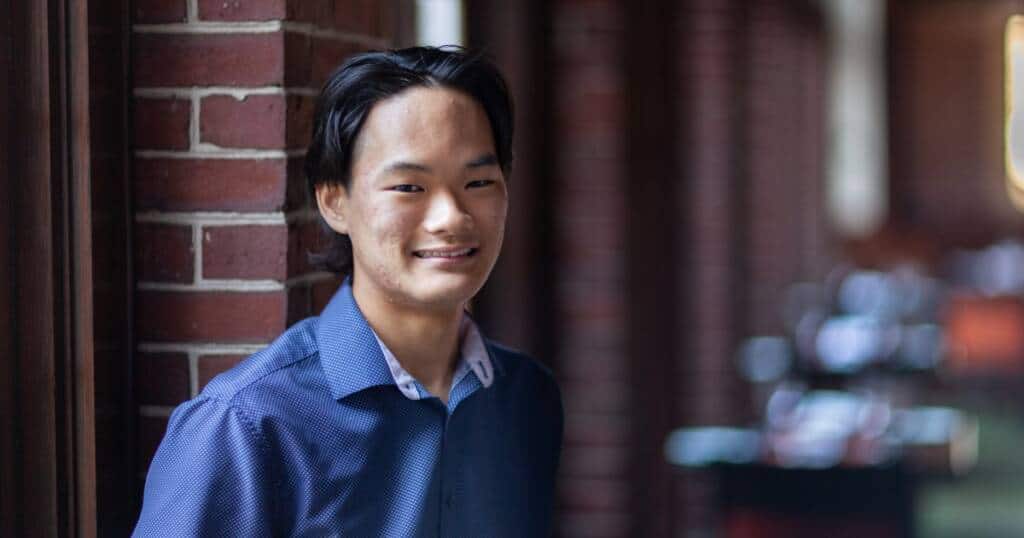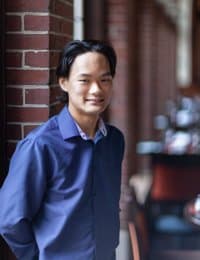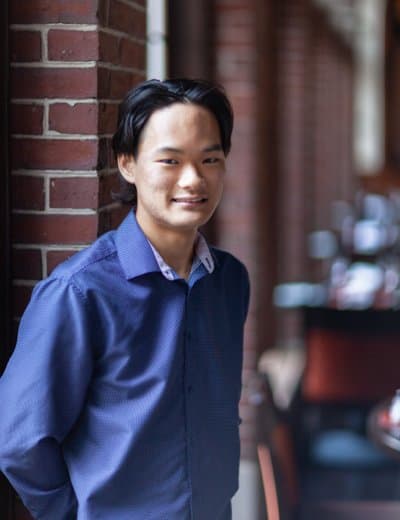
CIA Student Bio
“My hope was that if I came out successful, then I would be a source of inspiration for other students with disabilities to pursue their dreams despite any circumstances.”
How did you become interested in food?
Growing up, I appreciated food as if it were a treat, and I still do today. Even when food wasn’t in front of me, I would scrutinize magazines and cookbooks fantasizing the pleasure of eating the caramelized tops of crème brûlée. I had a deep connection and fascination surrounding the production and assembly of food; ultimately, this led me to pursue a culinary arts degree at The Culinary Institute of America.
Why did you choose the CIA?
I entered the CIA with no food industry-related work experience, much less culinary skills; however, I was determined to learn from the best certified chefs at the best culinary college in America. Additionally, having been born with only one hand meant that I would have to accomplish the impossible—which strangely motivated me to embrace the physical and mental challenges of working inside an environment that requires dexterity. My hope was that if I came out successful, then I would be a source of inspiration for other students with disabilities to pursue their dreams despite any circumstances.

How have scholarships and/or grants helped you reach your goal of getting a CIA education?
With the responsibility of paying for college on my own, combined with the fact I was born with half my left arm missing, I could have felt my culinary arts aspirations were over before they even got started. But scholarships gave me access to the CIA, and the staunch support from my chef-instructors helped me thrive. The CIA and its benefactors inspired me to take risks, persevere, and believe that if you pursue your dreams with passion and dedication, then anything is possible.
What do you like best about the CIA?
My initial fear of feeling intimidation, judgement, and dissimilar was quickly masked by the support from many of my chefs, especially from a few known for being quite taciturn. They always had my back and were graciously willing to help me become successful through my course work and in applying for scholarships.
Do you belong to any clubs or participate in any activities/sports on campus?
My hard work through the associate’s program has been supported not just by my chef-instructors, but also by my liberal arts professors and other faculty who have shared my success. They introduced me to the Creative Services department to blog for the college’s website. I will be writing to the audience of prospective students and current students about the Applied Food Studies degree program—providing my insider’s take—as well as hopefully inspiring others who might have a disability like me to pursue their dreams at the CIA. It will be an opportunity to express myself and think creatively, speaking to a larger audience through writing. I also signed up to contribute my work to the CIA’s newspaper, La Papillote. Additionally, I am involved in the school’s variety of fun intramural co-ed sport. All these activities coordinate the mind and body.
What is your favorite dish to make? Why?
Salads of any kind. I know very boring; however, I like how simple and easy it is to plan, prepare, and assemble. I can pretty much put anything I want in it—from fruits to nuts to meat. I can make it as heavy or as a light as I wish. I can make it sweet, sour, or a mixture of all the five tastes. There is so much flexibility and it is stress-free!
What is/are the best lesson(s) you’ve learned while at the CIA?
Simply 3 things:
- Stay humble
- Never say “Never”
- Don’t take anything for granted
What are your career goals and how will your CIA education help you get there?
Though it is too early to say for sure, I do not see myself in the kitchens. I am in the bachelor’s degree program to explore and investigate other career paths. It’s hard to say exactly what my goals are, but I’m thinking of staying within the field of academics, to use writing and speech to communicate about the pressing food issues that surround us.
My opportunities to blog and write for the school newspaper, as well as writing essays in my academic classes will help exercise my brain to consistently write on a daily basis. Additionally, the Applied Food Studies major will help me see the deep reality of food issues around the world. Perhaps graduate school will be an option, where I can work towards higher education, but that is far off into the future.
What advice would you give to a new student or someone who is considering attending the CIA?
To be blunt, do not come to the CIA thinking this will be an easy ride. You want to go party, go find a cheaper school. The program is rigorous, orderly, and structured, where the focus is to prepare students for success in the real word through experiential learning. However, while you spend the bulk of your time in the kitchen, you will also spend a fair share of time in the academic classes. You are receiving a diploma, not a certificate of completion. My advice is to stay on top of your academic work. Do not underestimate the work load.
Anatole Sullivan is a CIA student pursuing his bachelor’s degree in applied food studies at the college’s New York campus. He is from Northbrook, IL.
